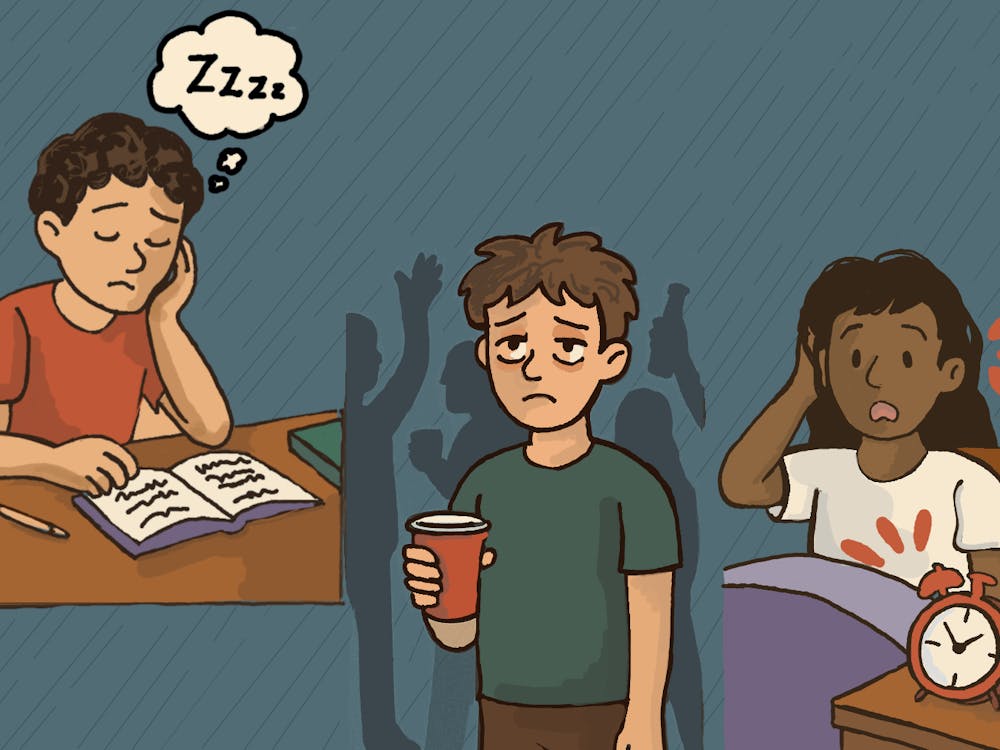When I began my college search in my junior year of high school, I was desperate for any and all advice I could get my hands on. After all, this was college! It only happened once, and for many people it constituted some of the best years of their lives. Determined not to mess it up, I took to asking all the college graduates in my life the same question — if you could do it all over again, what would you change? The overwhelming majority of people told me that they wished they had said yes more often. Instead of worrying about grades or others’ opinions, they would have taken the risk and made memories that would last a lifetime.
With their advice ingrained in my head, I started college determined to do the same. Especially last semester, I’ve gone on late-night adventures, chosen spontaneity and prioritized making memories over making perfect grades. What I didn’t know is that there’s a cost to saying yes. Equal to the nights I’ve spent staying out having fun with friends are the nights I’ve stayed up doing the work that I put off until just before the deadline. This isn’t necessarily a bad thing — after all, what is college known for if not caffeine addiction and all-nighters? However, in my quest to experience college to the fullest, I’ve come across the need to find the balance between having fun, taking care of myself and taking care of my schoolwork.
I remember seeing a graphic a few years ago that described the very dilemma I’ve found myself facing. Composed of a triangle, the three points were labeled grades, social life and sleep. The caption instructed students to choose two, implying that college kids wouldn’t be able to have all three. For a long time I was skeptical. I had all three in high school, and wasn’t high school more busy than college? In college, I would be taking a fraction of the classes I took in high school — surely there would be enough time to do everything. Of course, this was a lie. I’ve often joked with my friends that the high school version of myself would defeat college me anyday. It seems that as I gained free time, I lost the energy to fill it.
Given that I still want to find a job once I graduate, deciding to say yes and simply choosing my social life and sleep wasn’t an option. I also couldn’t choose to lose sleep. Over the past two semesters I’ve come to realize that I lack the ability to function without eight hours of sleep each night. So, if I still need sleep and good grades, would it be impossible to still make memories that seem to only happen during college? Fortunately for me, that hasn’t been the case. With the help of my planner, good friends and knowledge of my own limits, I’ve found that there are ways to have all three points of the triangle.
The first technique that has allowed me to find balance in my college career is my planner. I love my planner. It’s full-sized, with both calendar pages and space for week-by-week scheduling. If I wasn’t using it this year, I can’t imagine how I would finish all of my work. And while I recognize that using a planner isn’t for everyone, I would recommend finding a way to keep track of your schedule. By setting aside time for each task I need to do, I’m able to better understand my priorities and decide where I can make sacrifices for my social life and where I need to skip the fun to stay on top of my schoolwork.
The second element is finding good friends. This is easier said than done, but when you find people who truly want the best for you, who are willing to work around your schedule or accommodate your needs, it’s much easier to get everything done and have fun doing it. For example — I’m a member of Chi Alpha at the University, and many days last semester I found myself hanging out at the Chi Alpha Hub with friends, laughing and talking while still working on the homework I needed to get done for the next day. Because all of us respect the others’ need to be productive, we’re able to work together in a relaxed and fun atmosphere.
Finally, I’ve learned my own limits. As a University student there’s constant pressure to stay healthy, be social and maintain a stellar GPA. Earlier in the semester, I made the decision to drop a class. And while it was the smart thing to do, it was difficult. I had been taking an extremely large credit load and had worn that number like a badge of honor. I have to admit, I enjoyed seeing my friends’ reactions when they heard how many classes I was taking, hearing them gasp and ask, “Is that even allowed?” Thus, when I realized that it wasn’t sustainable and that I didn’t even really need the class to begin with, I had to swallow my pride. I placed my identity in my intelligence — even though credit hours have nothing to do with an individual’s intelligence — so much so, that dropping the class felt like letting go of a part of myself. By obeying the limits of my brain and my body, I’ve found so much more happiness. I gained time to take care of my spiritual health, physical health and social life — all of which are worth much more than superficial pride in a high credit load.
Thus, the triangle lied to us. It’s possible to have it all in college. However, it’s only possible if you place yourself in healthy environments and communities that allow you to do so.
Caitlyn Kelley is a Life Columnist for The Cavalier Daily. She can be reached at life@cavalierdaily.com.







